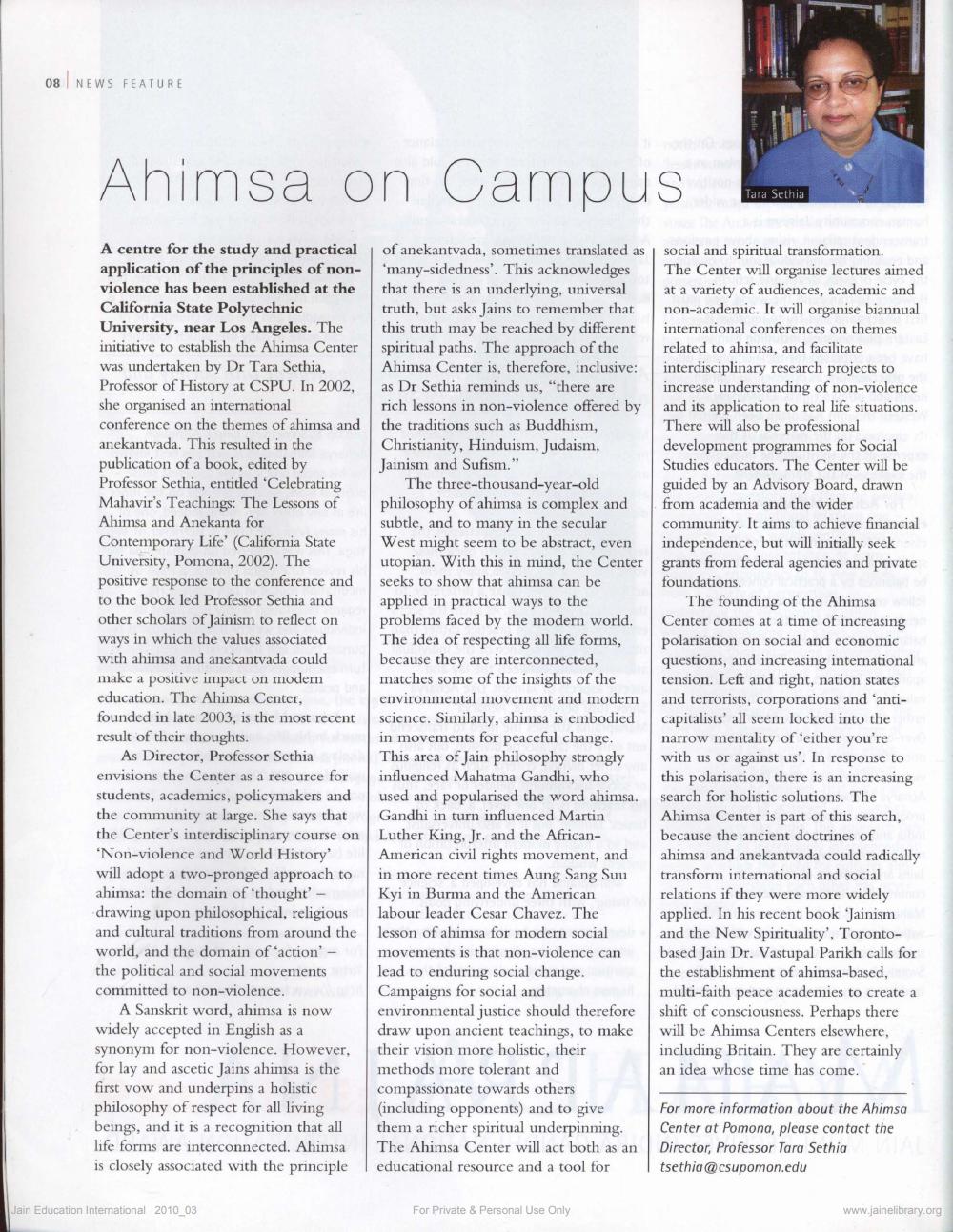________________
08 NEWS FEATURE
Ahimsa on Campus.
A centre for the study and practical application of the principles of nonviolence has been established at the California State Polytechnic University, near Los Angeles. The initiative to establish the Ahimsa Center was undertaken by Dr Tara Sethia, Professor of History at CSPU. In 2002, she organised an international
of anekantvada, sometimes translated as 'many-sidedness'. This acknowledges that there is an underlying, universal truth, but asks Jains to remember that this truth may be reached by different spiritual paths. The approach of the Ahimsa Center is, therefore, inclusive: as Dr Sethia reminds us, "there are rich lessons in non-violence offered by the traditions such as Buddhism, Christianity, Hinduism, Judaism, Jainism and Sufism."
conference on the themes of ahimsa and anekantvada. This resulted in the publication of a book, edited by Professor Sethia, entitled 'Celebrating Mahavir's Teachings: The Lessons of Ahimsa and Anekanta for Contemporary Life' (California State University, Pomona, 2002). The positive response to the conference and to the book led Professor Sethia and other scholars of Jainism to reflect on ways in which the values associated with ahimsa and anekantvada could make a positive impact on modern education. The Ahimsa Center, founded in late 2003, is the most recent result of their thoughts.
As Director, Professor Sethia envisions the Center as a resource for students, academics, policymakers and the community at large. She says that the Center's interdisciplinary course on 'Non-violence and World History' will adopt a two-pronged approach to ahimsa: the domain of 'thought' - drawing upon philosophical, religious and cultural traditions from around the world, and the domain of 'action' - the political and social movements committed to non-violence.
A Sanskrit word, ahimsa is now widely accepted in English as a synonym for non-violence. However, for lay and ascetic Jains ahimsa is the first vow and underpins a holistic philosophy of respect for all living beings, and it is a recognition that all life forms are interconnected. Ahimsa is closely associated with the principle
Jain Education International 2010_03
The three-thousand-year-old philosophy of ahimsa is complex and subtle, and to many in the secular West might seem to be abstract, even utopian. With this in mind, the Center seeks to show that ahimsa can be applied in practical ways to the problems faced by the modern world. The idea of respecting all life forms, because they are interconnected, matches some of the insights of the environmental movement and modern science. Similarly, ahimsa is embodied in movements for peaceful change. This area of Jain philosophy strongly influenced Mahatma Gandhi, who used and popularised the word ahimsa. Gandhi in turn influenced Martin Luther King, Jr. and the AfricanAmerican civil rights movement, and in more recent times Aung Sang Suu Kyi in Burma and the American labour leader Cesar Chavez. The lesson of ahimsa for modern social movements is that non-violence can lead to enduring social change. Campaigns for social and environmental justice should therefore draw upon ancient teachings, to make their vision more holistic, their methods more tolerant and compassionate towards others (including opponents) and to give them a richer spiritual underpinning. The Ahimsa Center will act both as an educational resource and a tool for
For Private & Personal Use Only
Tara Sethia
social and spiritual transformation. The Center will organise lectures aimed at a variety of audiences, academic and non-academic. It will organise biannual international conferences on themes related to ahimsa, and facilitate interdisciplinary research projects to increase understanding of non-violence and its application to real life situations. There will also be professional development programmes for Social Studies educators. The Center will be guided by an Advisory Board, drawn from academia and the wider community. It aims to achieve financial independence, but will initially seek grants from federal agencies and private foundations.
The founding of the Ahimsa Center comes at a time of increasing polarisation on social and economic questions, and increasing international tension. Left and right, nation states and terrorists, corporations and 'anticapitalists' all seem locked into the narrow mentality of 'either you're with us or against us'. In response to this polarisation, there is an increasing search for holistic solutions. The Ahimsa Center is part of this search, because the ancient doctrines of ahimsa and anekantvada could radically transform international and social relations if they were more widely applied. In his recent book 'Jainism and the New Spirituality', Torontobased Jain Dr. Vastupal Parikh calls for the establishment of ahimsa-based, multi-faith peace academies to create a shift of consciousness. Perhaps there will be Ahimsa Centers elsewhere, including Britain. They are certainly an idea whose time has come.
For more information about the Ahimsa Center at Pomona, please contact the Director, Professor Tara Sethia
[email protected]
www.jainelibrary.org
